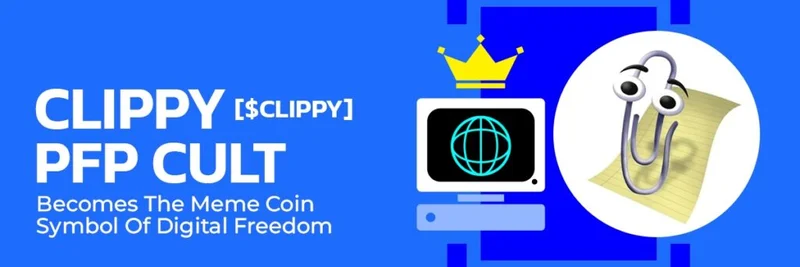Remember Clippy, that quirky paperclip assistant from old Microsoft Office days? Well, in the world of meme tokens, $CLIPPY is making waves not just as a nostalgic throwback, but as a beacon for privacy and anti-corporate exploitation. A recent thread on X by user @_Shadow36 sheds light on this, responding to questions about whether $CLIPPY is a privacy coin. Spoiler: it's not exactly a privacy coin, but it's definitely an advocate for privacy.
The Spark: A Question on $CLIPPY's Privacy Angle
It all started with a post from @heisajeet asking, "aped but how’s $clippy a privacy coin?" For those new to crypto slang, "aped" means jumping into an investment impulsively, often in meme tokens like those on Solana. Shadow36 jumped in with a clarifying thread, sharing excerpts from Reddit to explain the deeper narrative behind $CLIPPY.
The token, built on the Solana blockchain, draws from Clippy's legacy as a helpful tool that didn't spy on users or require constant internet access. Unlike modern AI assistants that often collect data or push ads, Clippy was straightforward and user-friendly. This resonates in today's crypto scene, where privacy concerns are rampant.
Reddit Excerpts That Hit Home
Shadow36 shared two key screenshots from Reddit discussions, emphasizing Clippy's symbolic role.
The first excerpt reads: "He basically started a trend and use clippy because it was the only product that didn't spy on you and only wanted to be helpful and didn't need an internet connection. This is a still ongoing a move to help the encouragement to fight against anti-consumer practices: - Protest against ransomware-like subscription models - Pushback against censorship and exploitative advertising - For Clippy symbolizes ethical software behavior This was to represent how many people won't deal with companies in general bad practices to milk consumers."
The second one adds: "Clippy just wanted to help, he wasn't perfect, but he never censored you, stole your data for advertisers nor even fully read your essays, he was a program with the sole intent of helping. Wich are now things corporates rarely do as now. AI bots and features in the modern internet age will have a catch, they will steal your data to train acting algorithms, they will be behind paywalls and they will censor you, everything that Clippy wasn't."
These snippets capture the essence of why $CLIPPY appeals to the community. It's not about technical privacy features like those in Monero; it's about cultural pushback against invasive tech practices.
Community Reactions and Momentum
The thread sparked engagement, with replies like @bullposted noting, "The fact that a 1997 paperclip is now our symbol for digital privacy..." and others hyping the token's potential. Comments about reaching "40m again soon" suggest market optimism, likely referring to market cap milestones. Even cross-promotions with other memes like $PFP appeared, showing the interconnected world of Solana memes.
As of now, $CLIPPY trades on platforms like DexTools and is listed on CoinGecko, where you can track its price and volume. It's part of a broader trend in meme tokens that blend humor, nostalgia, and social commentary.
Why $CLIPPY Matters in the Meme Token Space
In the fast-paced Solana ecosystem, meme tokens like $CLIPPY stand out by tying into real-world issues. Privacy is a hot topic in blockchain, with users seeking alternatives to centralized tech giants. By reviving Clippy, the token community is protesting subscription traps, data theft, and censorship—issues that plague modern software.
If you're a blockchain enthusiast, $CLIPPY offers a fun way to engage with these themes. Check out the full thread on X and see why this paperclip is clipping its way into crypto hearts. Who knew an old Office assistant could become a privacy hero?


